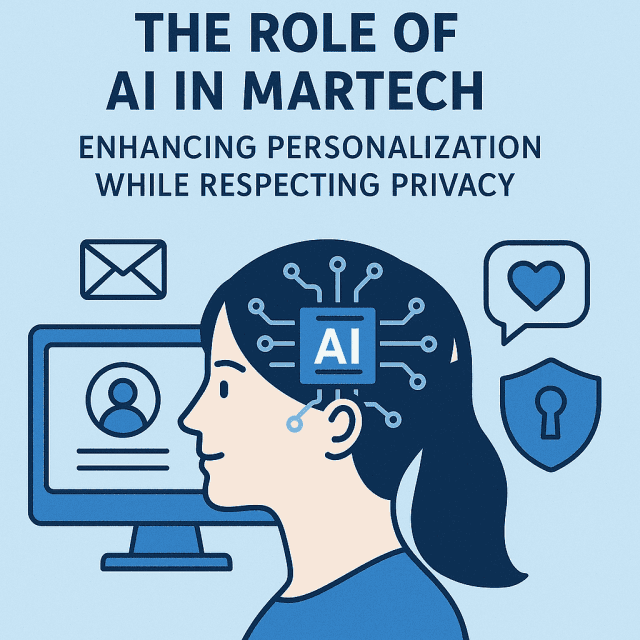In today’s dynamic digital landscape, marketing technology (MarTech) has become crucial for companies looking to engage consumers effectively. As brands seek to deliver personalized experiences, artificial intelligence (AI) has emerged as a pivotal player. However, while AI enhances personalization, it also raises significant concerns about consumer privacy. This article explores how AI is reshaping MarTech, the benefits of personalization, and the importance of safeguarding user data.
The Integration of AI in MarTech
Artificial intelligence is revolutionizing the way marketers analyze data, segment audiences, and deliver tailored messages. Its capabilities in processing large datasets allow for the identification of patterns and insights that were previously unattainable. Key areas where AI is making an impact include:
Data Analysis and Insights: AI algorithms can sift through vast amounts of data to uncover trends and consumer behaviors. This capability enables marketers to understand what resonates with their audiences, helping them craft more relevant campaigns.
Predictive Analytics: Leveraging machine learning, AI can predict future consumer behavior based on historical data. This insight helps marketers anticipate customer needs and preferences, optimizing the timing and content of their communications.
Dynamic Content Creation: AI enables the generation of personalized content at scale. By analyzing user interaction data, AI tools can create tailored messages, offers, and experiences that speak directly to individual consumer preferences.
- Consumer Journey Mapping: AI can track and analyze customer interactions across multiple touchpoints, providing a holistic view of the consumer journey. This understanding allows brands to enhance engagement by delivering timely, relevant communication.
Enhancing Personalization
Personalization is no longer a luxury; it’s a necessity. Studies show that consumers are more likely to engage with brands that offer tailored experiences. The benefits of effective personalization through AI include:
Improved Customer Engagement
Personalized experiences foster deeper connections with consumers. When brands provide content that aligns with individual interests, engagement levels rise. Whether through targeted emails, customized product recommendations, or tailored social media ads, the potential to enhance customer loyalty is significant.
Increased Conversion Rates
AI-driven personalization can lead to higher conversion rates. By delivering the right message at the right time, brands can guide consumers through the purchasing journey more effectively. This includes optimized landing pages and suggested products based on past behaviors.
Enhanced Customer Retention
Personalization not only attracts customers but also encourages them to return. Brands that remember customer preferences and tailor future interactions accordingly are more likely to cultivate long-term relationships.
The Privacy Challenges
While AI offers remarkable opportunities for personalization, it also presents privacy challenges that marketers must navigate carefully:
Data Collection Concerns
The collection of user data to fuel AI algorithms raises ethical questions. Users are increasingly aware of how their information is gathered and utilized. Brands must be transparent about data collection practices and obtain user consent.
Compliance with Regulations
Strict regulations, such as the General Data Protection Regulation (GDPR) and the California Consumer Privacy Act (CCPA), impose guidelines on how consumer data can be collected, stored, and used. Marketers must ensure compliance to avoid legal ramifications and maintain consumer trust.
Balancing Personalization and Privacy
Marketers face the delicate task of balancing personalization with privacy. Over-personalization can feel intrusive, leading consumers to disengage. It’s crucial for brands to find a middle ground where they can deliver relevant experiences without crossing privacy boundaries.
Best Practices for Implementing AI in MarTech
To leverage AI effectively while respecting consumer privacy, marketers can adopt several best practices:
Transparency: Clearly communicate how data is collected and used. Providing users with control over their data enhances trust.
Data Minimization: Collect only the data necessary to provide personalized experiences, thereby reducing potential privacy concerns.
Consent as a Foundation: Implement consent mechanisms that allow users to opt-in to data collection and personalization strategies.
Continuous Education: Keep consumers informed about their privacy rights and how brands are taking steps to protect their data.
- AI Ethics Framework: Establish ethical guidelines for AI usage in marketing processes, ensuring that AI applications promote fairness and do not discriminate against any group.
Conclusion
AI is transforming the MarTech landscape by enabling unparalleled personalization. However, as brands leverage these capabilities, it is imperative to respect consumer privacy. By adopting best practices that prioritize transparency, consent, and ethical considerations, marketers can harness AI’s power while fostering trust and loyalty among their customer base. The future of MarTech lies not only in smarter algorithms but also in the responsible use of data.









